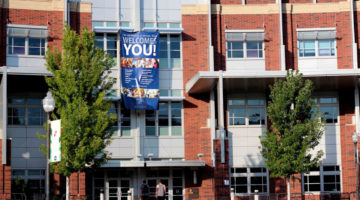
Breanna Denney /Nevada Sagebrush
Netflix star Laverne Cox speaks to a full audience last Thursday, April 9 in the Joe Crowley Student Union. Cox talk include her journey into womanhood and her views on Nevada Assembly Bill 375.
By Jennifer Marbley
Emmy-nominated transgender actress of “Orange is the New Black” Laverne Cox asked over 1,000 students of the University of Nevada, Reno on Thursday, April 9, “Ain’t I a woman?”
The Laverne Cox speaking tour came to UNR as hundreds of students flooded the Joe Crowley Student Union Ballroom to listen to Cox speak about transgender discrimination. Her talk was a part of Unity Week hosted by the Associated Students of the University of Nevada, Reno.
According to the National Coalition of Anti-Violence Programs, 78 percent of students in grades K-12 who identify as transgender experience harassment or bullying and the unemployment rate for transgender people of color is four times the national average. Transgender suicide attempts are also higher than the national average.
In response to these startling statistics, the goal of inviting Cox to speak about transgender issues was to help inspire a more gender-inclusive campus culture, according to ASUN Programmer Lily Davalos.
“Hopefully we will all walk away from the event with a better understanding of the challenges that transgender individuals face,” Davalos said during her introduction of Cox.
Learning to take pride in her identity was a long road, according to Cox. Her decision to be vocal about her transition wasn’t always a source of community admiration.
Freshman Thomas Schlosser said that Cox talked about a number of topics relating to gender and sexuality that are not frequently discussed.
“I think she talks about things that even other activists are afraid to touch on and she does it in a way that makes it accessible to everyone,” Schlosser said.
In addition to being marginalized for being transgender, she also faced hardships based on race and socioeconomic standing. During her talk on Thursday night, she emphasized the importance of accepting multiple identities.
“I stand before you this evening, a proud African-American, transgender woman from a working class background raised by a single mother,” Cox said. “I think it’s important to name the various intersecting components of my identity because I’m not just one thing and neither are you.”
Cox revealed the details of her life growing up in the small town of Mobile, Alabama and eventually moving to New York. There, she publicly accepted her identity as a woman and adopted her middle name “Laverne” as her first and kept her original last name “Cox.”
According to Cox, she worked as a waitress and was so poor that she was on a payment plan with her landlord to avoid eviction. In addition to financial difficulties, she described living under the constant threat of violence if she was “spooked” or others discovered that she was born a man in a public setting.
It wasn’t until 2012 where she auditioned for the role of Sophia Burset, a transgender inmate on “Orange Is the New Black,” that her life began to change. The show’s success catapulted her out of poverty as she gained notoriety as the first transgender person to be nominated for a Primetime Emmy Award. “Orange Is the New Black” is now beginning its third season on June 12, and is a widely-acclaimed series.
During her talk, Cox was also vocal about her opposition to Assembly Bill 375, a bill proposed in the Nevada State Legislature that would require all individuals to use restrooms according to their biological sex. According to Cox, AB 375 and similar legislation is discriminatory to transgender individuals.
Cox concluded her talk by encouraging audience members to use the hashtag “#TransIsBeautiful” on social media to increase transgender awareness.
Freshman Naomi Shiferan was among the student audience members who were introduced to Cox through her work on “Orange is the New Black.” She said that she considers Cox an inspiration for her boldness in discussing issues of gender and sexuality. Shiferan especially appreciated how Cox explained how forms of oppression intersect with one another.
“I love how she talked about the intersectionality of race, gender and sexuality,” Shiferan said. “That’s not talked about as much as it should be and I’m glad she brought it up.”
Cox encouraged students to become advocates and to help educate others to end unjust violence and discrimination against transgender people. She summarized this approach by quoting Cornel West, who said “Justice is what love looks like in public.”
Jennifer Marbley can be reached at rhernandez@sagebrush.unr.edu and on Twitter @TheSagebrush.











